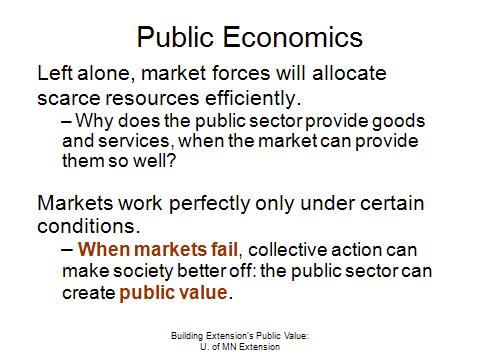Yesterday I taught a short version of the “Public Value of Public Programs (PVPP)” workshop for a Public Affairs class at the University of Minnesota. The PVPP workshop content is similar to that of the BEPV workshop, and the objectives are the same: to help people who develop, teach, evaluate, and advocate for publicly funded outreach programs to make a case for that public funding. The difference is that PVPP is not directed at Extension professionals, but at program providers in the government and nonprofit sectors.
I presented the slide below to introduce the idea that under conditions of market failure, collective action(for example, by the public or nonprofit sector) can improve the outcome for a community.
A student asked whether I was assuming that government or nonprofits would act efficiently and in the best interests of the people. In some developing countries, he noted, governments and non-governmental organizations (NGOs) are sometimes inefficient and corrupt. Their action, even in the presence of market failures, can make a community worse off than if the market failures had persisted.
Indeed, the PVPP program addresses the role of the public and nonprofit sectors when private enterprises (“the market”) fail, but is silent on the possibility of government or nonprofit failures. A shortcoming, indeed.
So, yes, to make a strong case for public funding of a program, it is necessary not only to explain how a public or nonprofit organization can in theory address issues that the private sector cannot (market failure), but to provide evidence that your organization will in practice act efficiently, benevolently, and honorably for the public good.
In Extension’s case, we can safely assume that our organizations always act efficiently, benevolently and honorably, right? Right?

